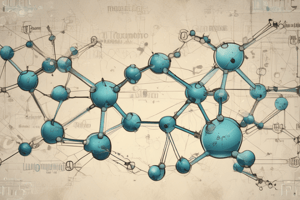Podcast
Questions and Answers
What is the primary focus of physical chemistry?
What is the primary focus of physical chemistry?
Which of the following is NOT a key insight gained through physical chemistry?
Which of the following is NOT a key insight gained through physical chemistry?
In what way does physical chemistry contribute to the development of solar cells?
In what way does physical chemistry contribute to the development of solar cells?
Which field heavily relies on physical chemistry for providing information about drug interactions and molecular design strategies?
Which field heavily relies on physical chemistry for providing information about drug interactions and molecular design strategies?
Signup and view all the answers
What is the main focus of inorganic chemistry?
What is the main focus of inorganic chemistry?
Signup and view all the answers
Which of the following is a common application of inorganic chemistry?
Which of the following is a common application of inorganic chemistry?
Signup and view all the answers
What is the primary focus of inorganic chemistry?
What is the primary focus of inorganic chemistry?
Signup and view all the answers
Which of the following is NOT a component that falls under the scope of inorganic chemistry?
Which of the following is NOT a component that falls under the scope of inorganic chemistry?
Signup and view all the answers
What is a significant area of interest in inorganic chemistry that involves exploring unique properties of nano-sized particles?
What is a significant area of interest in inorganic chemistry that involves exploring unique properties of nano-sized particles?
Signup and view all the answers
How do physical chemistry and inorganic chemistry intersect?
How do physical chemistry and inorganic chemistry intersect?
Signup and view all the answers
What is a key role that physical chemistry plays in inorganic chemistry laboratories?
What is a key role that physical chemistry plays in inorganic chemistry laboratories?
Signup and view all the answers
How have collaborative projects between physical chemists and inorganic chemists impacted industries?
How have collaborative projects between physical chemists and inorganic chemists impacted industries?
Signup and view all the answers
Study Notes
Exploring Chemistry's Foundations: Physical Chemistry and Inorganic Chemistry
Chemistry is like a vast tapestry of elements woven with bonds, reactions, and principles, painting our understanding of matter across diverse disciplines. Today we'll delve into two fundamental branches within this expansive field—physical chemistry and inorganic chemistry —to uncover their significance and shared facets.
Physical Chemistry
Physical chemistry centers its endeavors around applying scientific concepts from physics and mathematics to understand chemical phenomena. This branch aims to elucidate the behavior of systems containing atoms, molecules, and simple aggregates using quantitative models based on physics. Key insights gained through physical chemistry include thermodynamics, kinetics, statistical mechanics, spectroscopy, quantum chemistry, and electrochemistry. These tools help us predict how chemicals interact, react, absorb light, conduct electricity, and undergo phase transitions.
One fascinating application of physical chemistry lies in solar cells, where chemists manipulate material properties and band structures to create devices capable of converting sunlight directly into electric power. Moreover, physical chemistry plays a critical role in developing pharmaceuticals by providing vital information regarding drug interactions, absorption rates, and molecular design strategies.
Inorganic Chemistry
In contrast, inorganic chemistry focuses on investigating non-carbon compounds such as metals, metal alloys, metalloids, nonmetallic elements, and their various combinations. Unlike organic chemistry, which deals primarily with carbon-based molecules, inorganic chemistry encompasses a wide range of materials, including semiconductors, catalysts, batteries, pigments, and many other crucial components for modern technology and industry.
To give you an example, one prominent area of interest in inorganic chemistry is nanotechnology. Researchers synthesize novel nano-sized particles or assemble them into larger complex structures, exploring their unique electrical, magnetic, optical, and mechanical properties. Nanomaterials derived from inorganic chemistry have found applications in electronics, energy storage technologies, medicine, environmental remediation methods, and more.
Linking Physical and Inorganic Chemistry
While these fields differ in scope, they intertwine in several ways. For instance, both areas rely heavily on computational modeling, especially when it comes to analyzing large datasets to explore new possibilities for existing compounds or discover entirely novel ones. In addition, physical chemistry provides essential theoretical frameworks and experimental techniques used extensively in inorganic chemistry laboratories worldwide.
Moreover, when studying solid-state materials—such as oxides, halides, chalcogenides, carbides, nitrides, and borides—inorganic chemists often employ physical concepts as part of their analysis, prediction, and interpretation processes. Lastly, collaborative projects between researchers from these different branches have led to groundbreaking achievements in various industries, fostering innovations in cleaner energy solutions, enhanced medical diagnostics, and advanced materials science.
Studying That Suits You
Use AI to generate personalized quizzes and flashcards to suit your learning preferences.
Description
Explore the intertwined realms of physical chemistry and inorganic chemistry, uncovering the principles, applications, and connections within these essential branches of chemistry. Learn about thermodynamics, quantum chemistry, nanotechnology, and the collaborative advancements achieved when these fields merge.



